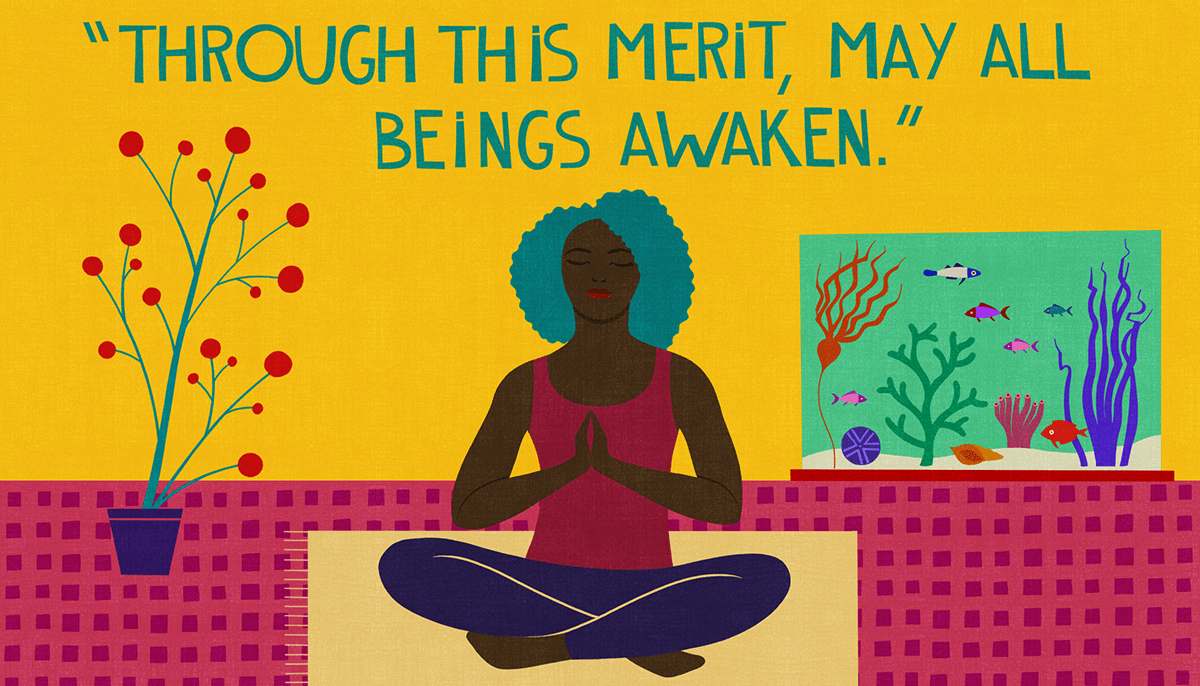Many forms of Buddhist practice conclude with dedicating the benefit of our practice to relieving the suffering of sentient beings and helping them awaken.
The English word “merit” is defined as being or doing something that is worthy and creates value. It is said that when we meditate or engage in another form of spiritual practice, such as yoga, chanting, praying, or singing songs of realization, we are accumulating merit. Dedicating this value—this wholesomeness—to all sentient beings expands our meditation beyond ourselves.
I had been studying and meditating in various traditions for some years when, at age twenty-five, I met my primary teacher, Kalu Rinpoche, a Tibetan Vajrayana master. When he taught me to dedicate the merit at the end of a session, I immediately noticed a big shift in my meditation. It felt like my whole practice opened up and became more effortless. It wasn’t just about me any longer. Dedicating the merit to others freed my practice to include all beings, and this eased the sense of tightness and contraction in my meditation. It was a relief.
Our radical imagining is that all beings are free, at peace, and awakened.
When we include humans, animals, and any and all sentient beings—maybe even alien life forms—in our practice, our minds connect with trillions of beings. This expands our consciousness to the unbound vastness. From our normal, limited perspective, we experience ourselves and others as separate. In reality, this is not the case, because we are interdependent. When we dedicate the merit of our meditation to all beings, we are in alignment with the truth of what is, and our self-concept expands, even if we don’t immediately notice it.
In dedicating our meditation to ease the suffering of all beings, we engage in an act of radical imagination. Our radical imagining is that all beings are free, at peace, and awakened. Imagining this stretches our minds and creates the possibility for it to actually happen, because if we cannot imagine something, it’s nearly impossible to actualize it.
In this radical imagining, our vision includes everyone equally in our love. This develops our generosity, loving-kindness, and commitment to the equality of beings. This kind of beneficence does not condone anyone’s destructive actions. Rather it looks toward the possibility of liberating and transforming the ignorance that drives people’s destructive actions.

Dedicating the merit of our meditation or spiritual practice is closely related to setting an intention at the beginning of our practice. This cultivates what is called bodhichitta, or awakened mind. So we enter into meditation with the intention to benefit all sentient beings. After that, we engage in the practice, and then, when we’re done, we make our dedication.
In the same way that making a dedication enhances and empowers our spiritual practice, it can empower all our actions in daily life. The merit accrued from any action—even if it is just washing the dishes or walking to work—can be dedicated to the benefit of all beings. That means we can make a dedication at the conclusion of a spiritual practice, or at the end of our day, after a meal, or at the conclusion of any activity.
There are many different formulas for dedication. You can also create a dedication in your own words. Some of the most common are:
Through this goodness may awakening spontaneously arise in our streams of being. May all obscurations and distortions fall away. May all beings be liberated from suffering, and the stormy waves of birth, sickness, old age, and death.
By this merit may all attain omniscience. May it defeat the enemy, wrong-doing. From the stormy waves of birth, old age, sickness, and death, from the ocean of samsara, may I free all beings.

Sometimes a dedication is done simply to the vast ultimate expanse, or what is called the dharmadhatu in Sanskrit. Tulku Urgyen, one of the greatest Dzogchen masters of the twentieth century, described the dharmadhatu as “the space within which all phenomena manifest, abide, and dissolve back into.” An example of this dedication is:
For the benefit of beings without exception, I dedicate without any reticence whatsoever all the merit accrued through virtuous acts, to the incomparable expanse of totality.
When we conclude our practice—or any other positive activity—by dedicating to others the merit we have developed, we grow in realization of the nondual nature of reality and our capacity to benefit the whole. Paradoxically, in dedicating the merit of our meditation to the benefit of all beings, we accrue further benefit for ourselves, helping us get closer to realizing the truth of what is.

